Olga's Gallery
In this newsletter we are glad to introduce you to two Russian artists
of the 19th century. One of them is Vasily
Perov (1834-1882), genre painter and portraitist, who created the portraits
of some outstanding representatives of Russian culture, among them Feodor
Dostoevsky.
Feodor Dostoevsky and Petrashevsky's Case
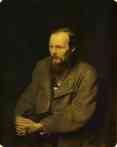 In the beginning of 1849 a political scandal shook St. Petersburg: the
Secret Police disclosed a conspiracy against the Tsarist government. A
certain group of young men, headed by one Petrashevsky, studied and spread
Socialism, liberation of the serfs, political freedom and other revolutionary
ideas. Scared to death, the Emperor, Nicholas I, demanded an exemplary
punishment for the members of the circle. 20 of them were sentenced to
death by shooting. Among them was Feodor Dostoevsky, the author of the
Poor
People,
Netochka Nezvanova, White Nights, works which
were already well-known.
In the beginning of 1849 a political scandal shook St. Petersburg: the
Secret Police disclosed a conspiracy against the Tsarist government. A
certain group of young men, headed by one Petrashevsky, studied and spread
Socialism, liberation of the serfs, political freedom and other revolutionary
ideas. Scared to death, the Emperor, Nicholas I, demanded an exemplary
punishment for the members of the circle. 20 of them were sentenced to
death by shooting. Among them was Feodor Dostoevsky, the author of the
Poor
People,
Netochka Nezvanova, White Nights, works which
were already well-known.
***
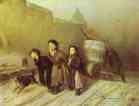 It hurt Dostoevsky to watch every day the effects of tyranny and slavery:
the suffering of the poor, the oppression of the middle class, the cruelty
to serfs found sympathy in him. He felt deep concern for his country. These
feelings brought him to Petrashevsky’s group, where young people read aloud
and discussed the works of Saint-Simon, Fourier, Robert Owen and the Belinsky’s
Letter
to Gogol, in which the critic reproached the writer in his latest views
in support of tzarism and slavery. During one of the meetings Dostoevsky
made a speech on Christian Socialism of Lamennais, whose views corresponded
to his own. The listeners almost cried, hearing his inspiring, enthusiastic
speech. Dostoevsky did not know that among the public present was an agent
of the secret police and that very soon he would have to pay dearly for
his calls for justice, freedom and brotherhood. April 23, 1849 he was arrested
and put into prison.
It hurt Dostoevsky to watch every day the effects of tyranny and slavery:
the suffering of the poor, the oppression of the middle class, the cruelty
to serfs found sympathy in him. He felt deep concern for his country. These
feelings brought him to Petrashevsky’s group, where young people read aloud
and discussed the works of Saint-Simon, Fourier, Robert Owen and the Belinsky’s
Letter
to Gogol, in which the critic reproached the writer in his latest views
in support of tzarism and slavery. During one of the meetings Dostoevsky
made a speech on Christian Socialism of Lamennais, whose views corresponded
to his own. The listeners almost cried, hearing his inspiring, enthusiastic
speech. Dostoevsky did not know that among the public present was an agent
of the secret police and that very soon he would have to pay dearly for
his calls for justice, freedom and brotherhood. April 23, 1849 he was arrested
and put into prison. 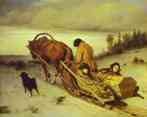
***
The first three of the accused were blindfolded and tied to the poles; Dostoevsky waited for his turn in the second group of three; the soldiers shouldered the arms. At that moment an official waved a white handkerchief. The execution was stopped, the official read a new sentence - the tzar's amnesty. Dostoevsky was sentenced to four years of penal servitude in Siberia and another four years of service as a soldier, also in Siberia.
***
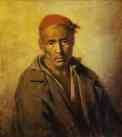 The
first four years were a nightmare. Four years in 10 pound shackles, hard
work in mines and then at a brick factory.
The
first four years were a nightmare. Four years in 10 pound shackles, hard
work in mines and then at a brick factory.
Besides physical privations, diseases, insults and humiliations, Dostoevsky suffered from constant presence of other people, there was no privacy for a single minute. He was among killers, robbers, rapists and maniacs, and he was forced to communicate with them. They, in their turn, hated him, because he was the only nobleman among them. Dostoevsky was forbidden to write, he just had no opportunity, starting with having no pen…
***
He was changed. He rejected his liberal ideas, which were the reason of his personal catastrophe. After coming in touch (and close contact) with real representatives of the Russian people, he renounced all his ideas idealizing the poor. More than before he left the necessity to believe in God; and Christ, who suffered for men, became for him the closest and most understandable character in the religion of all-forgiving and mercy.
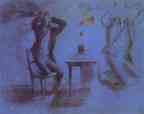 The Petrashevky’s case changed the lives of many people, and our second
artist, Pavel Fedotov (1815-1852),
was among them. Fedotov was not a member of the group, but he personally
knew some of them. And that cost him much; he was banned from society,
all commissions were canceled, and there were no new ones; soon he became
mentally unstable and died in a clinic for the poor, only thirty-seven
years old.
The Petrashevky’s case changed the lives of many people, and our second
artist, Pavel Fedotov (1815-1852),
was among them. Fedotov was not a member of the group, but he personally
knew some of them. And that cost him much; he was banned from society,
all commissions were canceled, and there were no new ones; soon he became
mentally unstable and died in a clinic for the poor, only thirty-seven
years old.